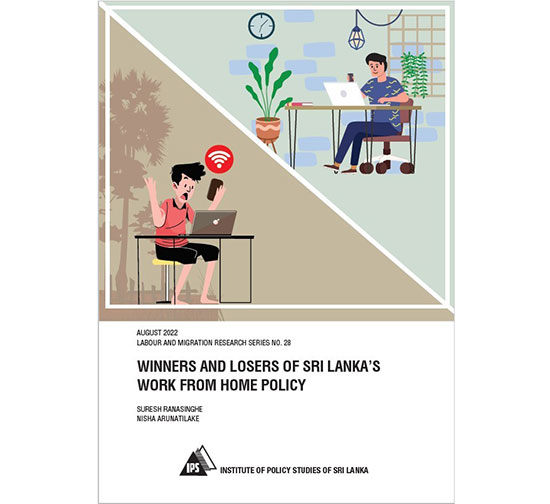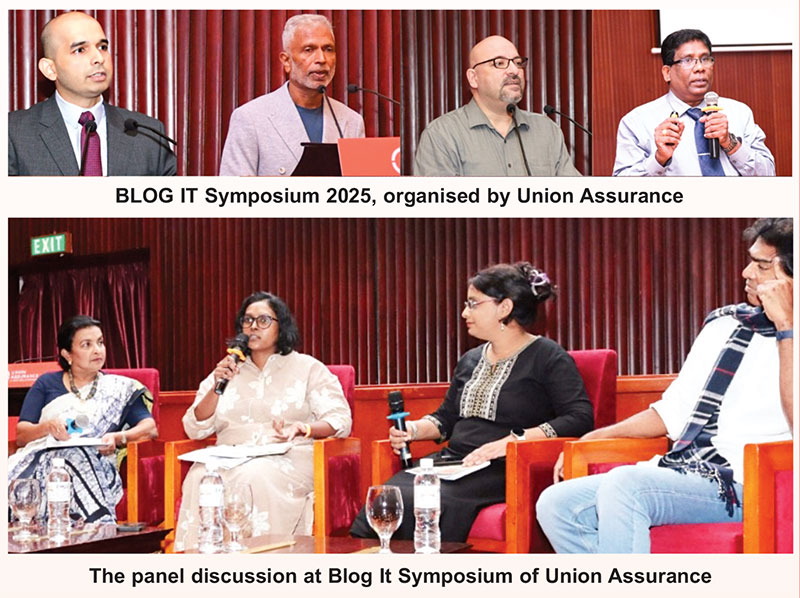Business
Winners and Losers of Sri Lanka’s Work from Home Policy

A new publication by the Institute of Policy Studies of Sri Lanka (IPS) has identified that a key barrier to remote work in Sri Lanka is the lack of relevant regulations and legislation governing the Work from Home (WFH) practice. Accordingly, the publication advocates legal reforms to facilitate WFH and improve labour market activities in the country amidst the ongoing economic crisis. The study notes that the Home Work Convention, 1996 adopted by the International Labour Organization (ILO) can be a springboard to reform domestic laws.
The latest IPS publication, ‘Winners and Losers of Sri Lanka’s Work from Home Policy’, is authored by Suresh Ranasinghe and Dr Nisha Arunatilake. The authors note, “The main legislations that provide a legal framework for work and remuneration such as the Shop and Office Act No. 19 of 1954 and the Wages Boards Ordinance No. 27 of 1941 do not facilitate WFH. Thus, it is vital to reform existing laws to facilitate WFH. The international standards included in the Home Work Convention, 1996 can be used to reform domestic laws to provide legal solutions to contemporary labour market problems.”
 The authors also call for increased investment in Information and Communications (ICT) infrastructure, together with training and financial support for workers. Given the nature of employment, however, workers in some occupations will find it challenging to WFH and as such, exploring means of supporting these workers is worthwhile to restore economic activities. Alongside this, employees’ well-being and continued productivity must be ensured. Therefore, attention should be paid to employees’ working time, performance, digitalisation, communication, occupational safety and health, and work-life balance.
The authors also call for increased investment in Information and Communications (ICT) infrastructure, together with training and financial support for workers. Given the nature of employment, however, workers in some occupations will find it challenging to WFH and as such, exploring means of supporting these workers is worthwhile to restore economic activities. Alongside this, employees’ well-being and continued productivity must be ensured. Therefore, attention should be paid to employees’ working time, performance, digitalisation, communication, occupational safety and health, and work-life balance.
The IPS study finds that the feasibility to work remotely in Sri Lanka is generally balanced by age, but it is significantly unbalanced by gender, educational attainment, income level, occupation, firm size, sector, and geographical location. Experiences of many developing as well as developed countries imply that severe recession can have negative impacts on future earnings and job security. Given this, remote work can be used as a long-term policy tool to enhance the available employment opportunities and safeguard employment. Thus, it is essential to identify the potentials and pitfalls of the WFH policy to facilitate the development of the WFH practice within Sri Lanka’s unique labour market context.
According to the study, workers in the ICT, education, finance, and insurance sectors benefit the most. Generally, these occupations require less physical proximity and have a high reliance on digital tools and technologies. However, those in the agriculture and industrial sectors have low WFH feasibility, and notably, most employees are in occupations where the feasibility to work remotely is low. Those who are less educated and reside in the estate sector also have very low WFH feasibility. Not surprisingly, employees’ ability to WFH increases with the level of English literacy but slightly deteriorates with age. Similarly, the ability to WFH is high in the Western province of Sri Lanka while the Southern, Northern and Eastern provinces have low plausibility to WFH.
The study contends that WFH can be used as a policy tool to address problems relating to female employment. Many legal loopholes do not cover the major problems faced by female employees. Further, day-to-day travelling to the office and home is a burden and health concern faced by pregnant female workers. In this context, remote work can be used to facilitate pregnant female workers by including a WFH policy in the existing legislation. Additionally, when employers design flexible work arrangement facilities, support must be given to female employees with care responsibilities. Equally, to enable female employees to WFH, it is vital that employers continue to promote family-friendly policies to encourage men to share the responsibilities of household activities.
To purchase a copy of ‘Winners and Losers of Sri Lanka’s Work from Home Policy’, contact: Amesh Thennakoon, Publications Officer, IPS on 0773 737717 or amesh@ips.lk. For more information on IPS publications, visit: https://www.ips.lk/publications.
Business
Russell’s Tea partners with Sri Lanka’s indigenous community

Allocates 4% of global sales for their socio-economic empowerment
Sri Lankan tea exporter Russell’s Tea (Pvt) Ltd achieved a historic milestone by signing a Memorandum of Understanding (MOU) to allocate 4% of its international sales revenue from ‘Russell’s Ceylon Ancestral Herbal Infusions’ toward the sustainable development of Sri Lanka’s indigenous community.
The company simultaneously launched five premium tea ranges—Ceylon Health and Wellness Teas, Ceylon Ancestral Herbal Infusions, Ceylon Fine Teas, Ceylon Organic Specialty Teas, and Ceylon Artisan Teas—to the global market, beginning with the UAE.
The MOU, formalizing the 4% revenue pledge, was signed by Russell’s Tea Director Jehan Perera and Vedda leader Uruwarige Wannila Aththo during a ceremony at Colombo’s Amari Hotel on Saturday. This agreement marks the first time the indigenous community will receive dollar-denominated compensation for sharing their ancestral knowledge of herbal remedies, which contributed to the development of Russell’s Ceylon Ancestral Herbal Infusions.
“Our R&D team drew significant inspiration from the Vedda community’s traditional wisdom on natural health benefits,” said Jehan Perera. “We believe it is our responsibility to reciprocate by supporting their socio-economic growth through this initiative.”
He added that the company plans to export the Community’s goods like wild honey in the future, further integrating the community into global markets.
Russell’s Tea has already secured partnerships with major UAE retailers, including the Lulu supermarket chain, with plans to expand across Gulf Cooperation Council (GCC) countries and Europe. All products, targeting luxury and tourism sectors, will be available in leading supermarkets by late June.
Celebrating its 38th anniversary, Russell’s Tea founder Russell Perera reflected on the company’s evolution: “From pioneering Sri Lanka’s corporate outdoor catering service to becoming a forex-earning exporter, this global launch symbolizes our commitment to innovation and national progress,” he said.
By Hiran Senewiratne
Business
Shyam takes helm at Sunshine Holdings as nephew succeeds uncle Vish in leadership transition

Under a Colombo sunset at the Taj Samudra, laughter, applause, and celebratory toasts recently marked the farewell of Vish Govindasamy, who stepped down from his executive role at Sunshine Holdings PLC after 28 years of transformative leadership.
The event, attended by business leaders, Sunshine’s senior team, and industry stakeholders, honoured his legacy as he transitioned to the Non-Executive Deputy Chairman role, while his nephew, Shyam Sathasivam, assumed the Group CEO position—a testament to the family bond steering this corporate evolution.
Sunshine Holdings announced that Govindasamy would continue in advisory capacity to ensure strategic continuity.
Govindasamy’s tenure which began in 1997 as CEO of Watawala Plantations, saw the Group expand into healthcare, consumer goods, renewable energy and dairy, while launching iconic brands such as Zesta, Watawala Tea, and Ran Kahata as well as Healthguard Pharmacy. Under his stewardship, Sunshine forged partnerships with global giants such as Wilmar and SBI Japan, earned recognition among Asia’s Best Workplaces, and championed social impact through the Sunshine Foundation for Good.
Shyam Sathasivam, Govindasamy’s nephew and successor, joined Sunshine in 2005 and has been integral to its recent growth. Having collaborated closely with his uncle for nearly two decades, Shyam emphasised his commitment to upholding the Group’s purpose-driven ethos: “Mr. Govindasamy nurtured a vision that blends business with heart. I am honored to build on this legacy, ensuring we continue to care for all stakeholders,” he stated at the farewell event.
During his address, Govindasamy observed attendees dispersed across the room and humorously underscored his attention to detail by remarking, “I kindly request everyone to assemble closer to the stage—such nuances catch my eye, a testament to my micro-management tendencies.” The lighthearted comment drew laughter while reflecting his reputed dedication to organizational precision.
Then shifting to the matter at hand and reflecting on his journey, Govindasamy acknowledged the Group’s resilience through Sri Lanka’s civil war and economic crises, expressing confidence in his nephew’s leadership: “Sunshine’s future is bright under Shyam. Our shared values and his forward-thinking approach will drive new heights,” he said.
The transition underscores a unique fusion of family trust and corporate strategy, positioning Sunshine Holdings for its next chapter.
By Sanath Nanayakkare
Business
Union Assurance is redefining financial literacy in Sri Lanka

‘Blog It Symposium’
The ‘Blog It Symposium’ hosted by Union Assurance on March 27 at the BMICH, had drawn writers, students and professionals alongside literary giants like Ashok Ferrey. The event was less a corporate gathering and more a cultural movement, symbolising a quiet revolution in Sri Lanka’s journey toward financial empowerment.
Financial literacy, often confined to jargon-filled pamphlets or intimidating technical writeups, has found an unexpected ally in storytelling with Union Assurance’s Blog It initiative, launched years prior, which recognises a universal truth: people connect with stories, not statistics. By inviting bloggers and writers to explore themes like life insurance, savings, and generational wealth through personal narratives, the initiative transforms complex concepts into relatable tales. A mother’s account of securing her child’s education amid economic uncertainty, a young entrepreneur’s journey from debt to stability, or a retiree’s challenges in the rest of his or her life were the seeds of stories that resonated deeply with the writers in the audience especially because they are writing for a society whose financial planning is often overshadowed by day-to-day struggles.
Ashok Ferrey, the keynote speaker asked the audience,” Why do we write? “We write,” he suggested, “to express ourselves in ways that evade the rigid pathways of ordinary consciousness.” Imagine, he said, slipping into a disguise to go to a fancy dress party; that lets you be someone else. Writing, in Ferrey’s vision, operates similarly—it is a costume party for the psyche. “When we write, we shed the constraints of our daylight selves. The keyboard or pen becomes a mirror that reflects not who we are, but who we might invent,” he said.
“These aren’t just blogs,” remarked Lal Medawattegedara, novelist and symposium panelist. “They’re survival guides written in the language of the people.”
Rather than lecturing, Union Assurance has created a platform for dialogue. Winning entries, published in newspapers and shared across social media, turns anonymous writers into local influencers. A gem merchant from Ratnapura, whose blog on gem buying and selling would go viral, encouraging young people in the area to follow suit. A Colombo college student’s poem about her family’s medical debt would inspire a community savings drive. “Financial literacy isn’t about telling people what to do,” said Union Assurance CMO Mahen Gunarathna. “It’s about giving them the tools to write their own futures.”
As the 2025 symposium concluded, the message was clear: financial literacy is not a solo journey but a shared narrative.
In a world where money talks, Union Assurance has mastered a profound lesson: sometimes, the most powerful currency is a story well told. Sri Lankans are not just learning about finances—they’re rewriting their financial destinies with the support of Union Assurance.
By Sanath Nanayakkare
-

 Foreign News7 days ago
Foreign News7 days agoBuddhism’s holiest site erupts in protests over Hindu ‘control’ of shrine
-

 Features5 days ago
Features5 days agoCelebrating 25 Years of Excellence: The Silver Jubilee of SLIIT – PART I
-

 Sports1 day ago
Sports1 day agoSri Lanka’s eternal search for the elusive all-rounder
-

 Business3 days ago
Business3 days agoAIA Higher Education Scholarships Programme celebrating 30-year journey
-

 Business5 days ago
Business5 days agoCEB calls for proposals to develop two 50MW wind farm facilities in Mullikulam
-

 Features5 days ago
Features5 days agoNotes from AKD’s Textbook
-

 News2 days ago
News2 days agoGnanasara Thera urged to reveal masterminds behind Easter Sunday terror attacks
-

 News1 day ago
News1 day agoComBank crowned Global Finance Best SME Bank in Sri Lanka for 3rd successive year











